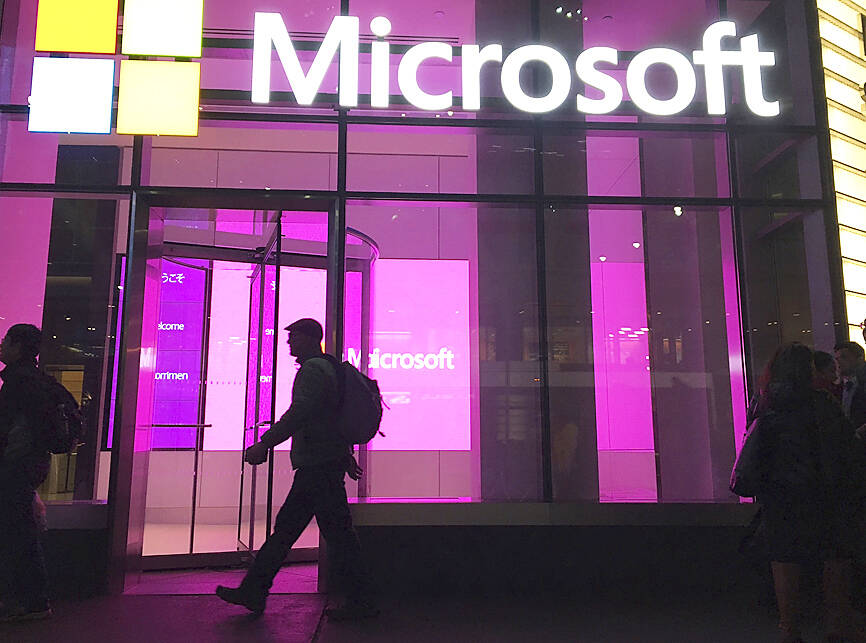Microsoft Corp said it is making a “multiyear, multibillion-dollar investment” in the artificial intelligence (AI) start-up OpenAI, maker of ChatGPT and other tools that can write readable text and generate new images.
The tech giant on Monday described its new agreement as the third stage of a growing partnership with San Francisco-based OpenAI that began with a US$1 billion investment in 2019. It did not disclose the dollar amount for its latest investment.
The partnership positions Microsoft to sharpen its competition with Google in commercializing new AI breakthroughs that could transform numerous professions, as well as the Internet search business.

Photo: AP
OpenAI’s free writing tool ChatGPT launched on Nov. 30 and has brought public attention to the possibilities of new advances in AI.
It is part of a new generation of machine-learning systems that can converse, generate readable text on demand and produce novel images and video based on what they have learned from a vast database of digital books, online writings and other media.
“In this next phase of our partnership,” customers who use Microsoft’s Azure cloud computing platform will have access to new AI tools to build and run their applications, Microsoft CEO Satya Nadella said in a statement.
“There’s lots of ways that the models that OpenAI is building would be really appealing for Microsoft’s set of offerings,” said Rowan Curran, an analyst at market research firm Forrester. That could include helping to generate text and images for new slide presentations, or creating smarter word processors, Curran said.
The technology could also help Microsoft’s own search engine, Bing, compete with Google in answering search queries with more complete answers instead of just links.
OpenAI started out as a nonprofit artificial intelligence research company when it launched in December 2015. With Tesla Inc CEO Elon Musk as its co-chair and among its early investors, the organization’s stated aims were to “advance digital intelligence in the way that is most likely to benefit humanity as a whole, unconstrained by a need to generate financial return.”
That changed in 2018 when it incorporated a for-profit business Open AI LP, and shifted nearly all its staff into the business, not long after releasing its first generation of the GPT model for generating human-like paragraphs of readable text. Musk left its board in 2018.
OpenAI said in its statement announcing the deal on Monday that it will still be governed by its nonprofit arm and that it remains a “capped-profit” company, though it did not specify what limits it sets on its profits.
“This structure allows us to raise the capital we need to fulfill our mission without sacrificing our core beliefs about broadly sharing benefits and the need to prioritize safety,” it said.
OpenAI’s other products include the image generator DALL-E, first released in 2021, the computer programming assistant Codex and the speech recognition tool Whisper.
The investment announcement came a day before Microsoft was scheduled to report its earnings from the October-December financial quarter and after disclosing last week its plans to lay off 10,000 employees, close to 5 percent of its global workforce.

CHIP RACE: Three years of overbroad export controls drove foreign competitors to pursue their own AI chips, and ‘cost US taxpayers billions of dollars,’ Nvidia said China has figured out the US strategy for allowing it to buy Nvidia Corp’s H200s and is rejecting the artificial intelligence (AI) chip in favor of domestically developed semiconductors, White House AI adviser David Sacks said, citing news reports. US President Donald Trump on Monday said that he would allow shipments of Nvidia’s H200 chips to China, part of an administration effort backed by Sacks to challenge Chinese tech champions such as Huawei Technologies Co (華為) by bringing US competition to their home market. On Friday, Sacks signaled that he was uncertain about whether that approach would work. “They’re rejecting our chips,” Sacks

NATIONAL SECURITY: Intel’s testing of ACM tools despite US government control ‘highlights egregious gaps in US technology protection policies,’ a former official said Chipmaker Intel Corp has tested chipmaking tools this year from a toolmaker with deep roots in China and two overseas units that were targeted by US sanctions, according to two sources with direct knowledge of the matter. Intel, which fended off calls for its CEO’s resignation from US President Donald Trump in August over his alleged ties to China, got the tools from ACM Research Inc, a Fremont, California-based producer of chipmaking equipment. Two of ACM’s units, based in Shanghai and South Korea, were among a number of firms barred last year from receiving US technology over claims they have

It is challenging to build infrastructure in much of Europe. Constrained budgets and polarized politics tend to undermine long-term projects, forcing officials to react to emergencies rather than plan for the future. Not in Austria. Today, the country is to officially open its Koralmbahn tunnel, the 5.9 billion euro (US$6.9 billion) centerpiece of a groundbreaking new railway that will eventually run from Poland’s Baltic coast to the Adriatic Sea, transforming travel within Austria and positioning the Alpine nation at the forefront of logistics in Europe. “It is Austria’s biggest socio-economic experiment in over a century,” said Eric Kirschner, an economist at Graz-based Joanneum

France is developing domestic production of electric vehicle (EV) batteries with an eye on industrial independence, but Asian experts are proving key in launching operations. In the Verkor factory outside the northern city of Dunkirk, which was inaugurated on Thursday, foreign specialists, notably from South Korea and Malaysia, are training the local staff. Verkor is the third battery gigafactory to open in northern France in a region that has become known as “Battery Valley.” At the Automotive Energy Supply Corp (AESC) factory near the city of Douai, where production has been under way for several months, Chinese engineers and technicians supervise French recruits. “They